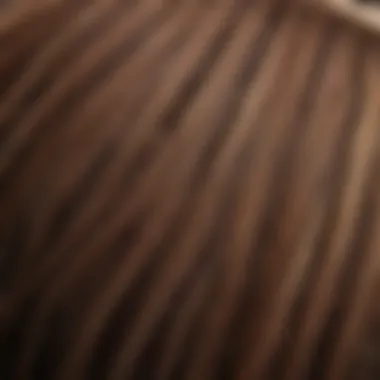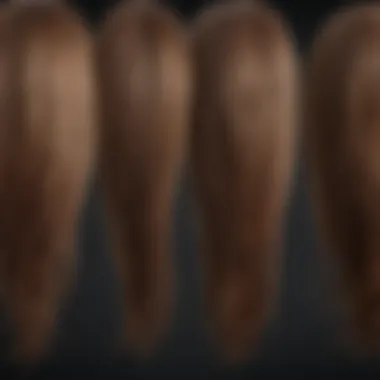Effective Ways for Men to Accelerate Pubic Hair Growth


Intro
Understanding how to grow pubic hair rapidly can be an essential topic for many men. Pubic hair growth is influenced by a variety of factors including genetics, hormones, and overall health. The desire to increase its growth may result from personal style choices or body image concerns. Thus, articulating effective strategies presents a worthwhile objective.
This article examines several key aspects of hair growth, focusing on effective methods to expedite the process. It will also break down numerous common misconceptions to ensure that information presented is based on scientific insights rather than myths. Ultimately, readers will gain more clarity regarding nutrition, grooming practices, and products that positively impact hair growth.
Factors Influencing Hair Growth
Understanding what influences hair growth can help men strategize better. Here are some fundamental aspects:
- Genetics: Your genetic makeup primarily determines hair growth patterns. Higher levels of androgens usually mean faster growth.
- Hormones: Hormonal balance plays an essential role. Testosterone, specifically, is critical in promoting body growth, including pubic hair.
- Nutrition: Diet impacts hair texture and growth rate. Essential vitamins and minerals help support healthy hair follicles.
Particularly, vitamins such as Biotin, Vitamin D, and minerals like Zinc ensure optimal hair health.
Grooming Practices
Given that grooming techniques affect hair growth, proper practices can aid in achieving optimal outcomes. Here are a few noteworthy grooming habits:
- Exfoliation: Regularly scrubbing the site may enhance blood circulation, stimulating the hair up growth.
- Trimming: Periodic trimming can encourage thicker hair by removing split ends and damage.
- Moisturization: Keeping the area hydrated supports the health of hair follicles, potentially promoting growth.
Moreover, choosing the right products for grooming also matters. Look for those that include nourishing and stimulating agents, such as essential oils.
Actionable Strategies
To actively support and stimulate growth, certain strategies can be beneficial. Consider the following tips:
Routines and Practices
- Priority on Health: Focus on maintaining overall health through regular exercise.
- Balanced Diet: Include proteins, healthy fats, and vitamins in meals.
- Hydrate Well: Drink an adequate amount of water daily. Hydration plays a significant role in hair health.
Suitable Products
- Minoxidil: This topical solution can encourage growth in many users.
- Natural Oils: Jojoba and coconut oils can aid in moisturization.
Common Misconceptions
It's crucial to highlight and dispel several misconceptions surrounding pubic hair growth:
- Myth: Shaving makes hair grow back thicker.
- Myth: Certain foods can cause instant hair growth.
- Truth: Shaving creates blunt ends, but does not affect the growth rate.
- Truth: While a balanced diet supports growth, no specific food will result in magical outcomes immediately.
Focusing on scientifically-backed methods rather than myth can lead to more successful results.
Wrap Up
Understanding how to accelerate pubic hair growth incorporates various elements, from genetics to dietary contributions. Some grooming habits can significantly popularize results. By employing the right strategies and debunking common myths, men can improve their chances of achieving dense pubic hair naturally and effectively.
Foreword
Growing pubic hair quickly can be a concern for many guys, encompassing several aspects of personal grooming as well as the social implications that hair can carry. For men interested in fashion and aesthetics, understanding the nuances of hair growth is paramount. This article explores various methods these men can use to achieve their desired levels of growth effectively.
While this topic might seem niche, it sheds light on the significance of grooming and self-care for men. Enhanced hair growth can contribute to physical appearance, boost confidence, and highlight personal style choices. Addressing men’s grooming practices not only supports their aesthetic goals, but it also connects with health and well-being parameters.


The strategies detailed in this piece aim to reflect a wider understanding of factors influencing hair growth. From genetic predispositions to nutritional considerations and grooming habits, each plays an instrumental role in determining how fast or slow pubic hair may grow. Thus, exploring these facets leads to a more comprehensive understanding for those curious how to optimize their own growth effectively.
"Understanding your body is critical in empowering your grooming choices."
The relevance of proper hair growth habits can't be overstated. With a knowledgeable approach, maintaining hair growth in a healthy way ensures style and masculinity are enhanced naturally. This introductory section sets forth the foundation needed to assess the remaining specific steps and productive strategies that follow.
Understanding Hair Growth
Understanding hair growth is vital for men looking to enhance the growth of pubic hair. ThisSection unpacks the intricate details of hair growth, emphasizing its biological foundations and external factors. A comprehensive grasp of these elements helps tailor approaches that genuinely contribute to quicker hair growth. This knowledge supports not just aesthetic preferences but also physical health and grooming standards.
The Hair Growth Cycle
The hair growth cycle consists of various stages: anagen, catagen, and telogen. During the anagen phase, hair actively grows, often lasting several years. The longer this phase, the more potential there is for growth. The catagen phase is a transitional stage, marking the end of active growth. Finally, telogen is a resting phase when hair falls out naturally. Understanding this cycle is crucial because each person experiences these stages differently, impacting the speed and density of hair growth.
Factors Influencing Hair Growth
Genetics
Genetics play a central role in determining hair growth patterns, including speed and density. If a family history of dense or slow-growing hair is noted, it may serve as a strong indicator of similar traits. Men with genes favoring rapid hair growth often find it easier to maintain fuller pubic hair. On the flip side, those genetically predisposed to slower growth must adopt robust solutions that might include lifestyle tweaks and targeted treatments.
Hormonal Effects
Hormonal levels significantly affect hair growth as they regulate the hair follicles. Increased testosterone levels, for instance, can stimulate growth. For those looking to grow pubic hair quickly, maintaining a healthy hormonal balance is essential. Too high or too low levels of certain hormones can lead to sluggish growth or thin density. Thus, understanding and managing hormonal health can positively influence pubic hair growth.
Age and Hair Density
Age significantly influences hair density and overall growth patterns. Young men, typically in their 20s and early 30s, may experience faster and denser hair growth compared to older counterparts. Aging often brings a decrease in hair density due to hormonal changes and natural follicle fatigue. Recognizing these developments is crucial for implementing appropriate strategies for maintaining or enhancing growth in alignment with one’s age.
Nutritional Considerations
A critical, often underappreciated component influencing pubic hair growth involves nutrition. The body requires a wide range of nutrients to support optimal hair development. Nutritional deficiencies can slow down or complicate the hair growth process, emphasizing the necessity of integrating essential elements into your diet for faster results.
Importance of a Balanced Diet
A balanced diet serves as the foundation for healthy hair growth. For men, this means including various food groups to provide overall nutrition. A diet rich in vegetables, fruits, whole grains, and lean proteins promotes not just general fitness but can also significantly influence hair health.
When the body is well-nourished, it can more effectively direct resources toward bodily processes, including hair growth. It is advisable to avoid excessive intake of refined sugars and saturated fats, which can hamper this process.
Key Nutrients for Hair Growth
Vitamins and Minerals
Vitamins and minerals play an essential role in the hair growth cycle. Notably, Biotin (Vitamin B7) has gained popularity for its significant effects in promoting strong, healthy hair growth. Also, Vitamins A, C, D, and E, along with minerals like Zinc and Iron, are paramount. Each has unique contributions:
- Vitamin A helps with cell growth, which is key for hair follicles.
- Vitamin C facilitates collagen production, enhancing hair structure.
- Vitamin D is linked with the creation of new hair follicles.
- Vitamin E acts as an antioxidant, protecting with your follicles from damage.
These vitamins are beneficial choices for those wanting to foster a conducive environment for hair growth. Each nutrient also has potential downsides, particularly if consumed excessively. Too much Vitamin A can lead to toxicity, impacting your health negatively.
Proteins and Healthy Fats
Proteins and healthy fats constitute another crucial segment of a diet aimed at optimizing hair growth. Hair is largely made of keratin, a fibrous protein, thus adequate stages and sources of protein, like chicken, fish, legumes, and nuts, become invaluable. Healthy fats, primarily omega-3 fatty acids found in fish like salmon and seeds such as flaxseed, support hair hydration and vitality.
Including sufficient protein is fundamental, as it helps build and repair tissues, focused on developments within hair follicles. Omega-3s can add shine and form solidarity to the delicate hair structure. Both nutrients serve as indispensable elements of the diet conducive to stimulating and sustaining hair growth, backing the main goal of this article.
Grooming Habits


Grooming habits play a crucial role in the way hairs develop and flourish. For men seeking to grow their pubic hair quickly, understanding the nuances of grooming is vital. Regular grooming not only maintains hygiene but also ensures an environment conducive to hair growth. Various factors, such as the products chosen and techniques applied, can either enhance or hinder progress.
Regular Maintenance
Regular maintenance involves the consistent care of the pubic area, which includes careful trimming and light grooming practices. By keeping the area tidy, men can encourage better blood circulation which is beneficial for hair growth. Additionally, a neat undergrowth reinforces a sense of personal care, enhancing overall confidence.
Essential Practices:
- Trim instead of shave: The act of shaving can cause irritation. In contrast, trimming avoids skin abrasion while keeping the area tidy.
- Cleanliness: Maintaining hygiene daily ensures that any product you use will impact your hair positively. Bacteria can weaken hair growth, so washing regularly is essential.
- Use mild products: Opt for gentle soaps or body washes without harsh ingredients. Avoid anything with excessive fragrances or chemicals.
By adopting considerate and consistent grooming habits, men can significantly increase the potential for satisfactory growth of their pubic hair.
Avoiding Over-Grooming
One commonly overlooked aspect is over-grooming. While regular grooming yields benefits, excessive practices can lead to adverse outcomes for hair growth.
Over-grooming can manifest as trimming too frequently, using harsh products, or being overly aggressive with hair removal. All this can lead to skin irritation, ingrown hairs, and slow down growth in the long run.
Key Points to Consider:
- Frequency matters: Finding the right balance is essential. Weekly grooming generally suffices for maintenance purposes rather than doing it every few days.
- Irritation signs: Be attentive to symptoms such as redness, itching, or swelling—these could indicate you've been too aggressive in your grooming.
- Give hair time to grow: Allow your hair some time to grow fully before deciding to groom it again. It’s a process and genuine patience is crucial.
Topical Treatments
Topical treatments play a significant role in accelerating pubic hair growth. These products can be applied directly to the skin, targeting individual hair follicles, and may offer solutions that are more focused compared to systemic remedies. Many topical applications are rich in nutrients known to foster hair growth, making them useful in this context. It is essential to choose the right products based on individual hair and skin type. The effectiveness of topical treatments can vary, but incorporating them into a daily routine may yield positive results. Additionally, they can complement other strategies like a balanced diet and proper grooming.
Hair Growth Oils and Serums
Hair growth oils and serums are particularly popular among those attempting to enhance pubic hair growth. These products are devised to nourish hair follicles, improve blood circulation, and minimize inflammation in the affected areas. Regular application can lead to a more robust growth pattern while maintaining skin health. Some oils contain unique compositions that provide moisture, thus preventing irritation. Overall, these topical treatments can integrate well into grooming regimens, offering both benefits and convenience.
Natural Remedies
Natural remedies have gained traction as viable options in promoting hair growth. They often contain beneficial herbs and oils, aligning with holistic practices. Understanding these natural alternatives enables individuals to make informed decisions regarding their hair care.
Aloe Vera
Aloe Vera is known to have numerous benefits for the skin and hair. Its gel-like consistency helps in moisturizing and soothing rather dry areas around the pubic region. This characteristic is essential for preventing flakiness or irritation while hair grows back. What sets Aloe Vera apart is its ability to nurture hair follicles without causing harmful side effects. Its unique feature is how it can simplify grooming. Although its impact on rapid hair growth might be gradual, the advantages include overall skin and hair health, making it a valuable additive for this article.
Castor Oil
Castor oil is another noteworthy natural remedy valued for hair growth. It contains ricinoleic acid, which is said to increase blood flow to the follicles, potentially encouraging hair growth in the targeted area. Castor oil also possesses nourishing properties that can give hair a shiny appearance while preventing dryness and breakage. Its key characteristic is its thick consistency, making it essential to use sparingly. Though users may find it very effective, its disadvantages could include difficulty in washing off the oil entirely. Hence, it may not be appealing for everyone. Nevertheless, considering its contribution to promoting hair growth, castor oil remains a prevalent choice in discussions surrounding natural remedies.
Lifestyle Factors
Lifestyle factors play a significant role in hair growth, including pubic hair. The way individuals live their lives can potentially enhance or hinder the growth of hair. Understanding these factors can empower men to make informed choices that contribute favorably to their grooming aspirations.
Stress Management
Stress, an omnipresent element in modern life, significantly impacts many physiological processes, including hair growth. When stress levels elevate, the body releases hormones like cortisol, which may disrupt the hair growth cycle. This disruption could lead to slower growth or, in some cases, hair loss. Effective stress management techniques such as meditation, exercise, and deep-breathing exercises, can foster an environment conducive to healthier hair growth.
Incorporating consistent physical activity not only alleviates stress but also improves blood circulation. Several forms of exercise, particularly cardiovascular, stimulate oxygen-rich blood flow to the hair follicles. Engaging in outdoor activities can also expose individuals to sunlight, promoting vitamin D synthesis, which might further aid in hair growth.
Moreover, practicing mindfulness through meditation can combat negative stress responses and enhance one’s mental well-being. Freeing themself from the burden of daily stresses can lead to a less turbulent hair growth environment. Occasionally reaching out to a friend or professional for additional support can also underpin personal success in handling stress.
Adequate Sleep


Quality sleep is another essential lifestyle factor impacting hair health. During sleep, the body undertakes various regeneration processes. Growth hormones are primarily produced during deep sleep. Insufficient sleep compromises these hormone levels, potentially diminishing hair growth.
Aiming for seven to nine hours of quality sleep per night can create positive conditions for hair to grow. Establishing a sleep routine that encourages consistency will also help maintain these crucial growth hormones at optimal levels. Avoiding screens before bedtime enhances melatonin production, which is key for deep sleep. As a simple step, consider turning devices off an hour before sleep, selecting instead a good book or relaxing herbal tea.
Choosing a congenial sleep environment will further assist in achieving restorative slumber. Maintaining a comfortable room temperature, reducing noise disturbance, and ensuring darkness can create the ideal setting for sleep.
In summary, both stress management and adequate sleep prevail as two pivotal lifestyle factors for promoting faster pubic hair growth. By adopting mindfulness techniques and cultivating healthy sleep hygiene, individuals can directly bolster their chances of timely hair growth.
Understanding Myths and Misconceptions
Understanding the misconceptions surrounding pubic hair growth is essential for men who wish to manage their grooming effectively. Often, misconceptions can lead to misguided practices that may hinder, rather than promote, healthy hair growth. Addressing these myths reinforces the significance of employing sound strategies grounded in fact. By pinpointing what is true and what is not, individuals can make informed decisions that support their grooming journey.
Fact vs.
Fiction
It is critical to distinguish facts from popular myths related to pubic hair growth. A number of beliefs exist that, although widespread, can lead to ineffective or damaging routines.
- Myth 1: Shaving Slows Hair Growth
Many believe shaving or trimming will produce thicker or faster regrowth. This is not accurate. Shaving does not affect the hair follicle's ability to grow; rather, it simply removes the hair at the surface. The perception that hair regrows thicker is more about the angle of the hair as it emerges from the skin. - Myth 2: Pubic Hair Causes Odor
Another common misconception is that pubic hair provides significant odor. Hygiene is key in combating body odor. Excess hair does not inherently promote smell; it is often unwashed skin that leads to odor. Regular grooming practices and hygiene as factors contribute more significantly than simply the presence of pubic hair. - Myth 3: All Natural Remedies Are Effective
While certain natural remedies, such as aloe vera and coconut oil, can indeed offer benefits, not all home solutions are beneficial for hair growth. Evidence supporting their effectiveness is often anecdotal and varies from person to person; routines should be approached with discretion.
Having clarity about what is myth versus fact about pubic hair can empower men in their grooming practices. This clarity frees them from reliance on ineffective methods, enabling them to choose the right strategies grounded in reality. > "Knowledge is power when it comes to understanding one’s own body."
Consulting Professionals
Consulting with professionals about hair growth can be beneficial for numerous reasons. Sometimes, individuals may experience slower hair growth due to underlying health problems or incorrect grooming habits. Consulting a dermatologist or a trichologist can help identify these issues. These specialists have the knowledge to diagnose potential concerns and recommend therapies or products based on individual cases.
Professional advice is valuable when it comes to understanding more complex elements that may not be known to the general public. They possess the expertise to provide personalized solutions, targeted to unique hair growth patterns and personal goals. Their recommendations can improve effectiveness and speed up the desired hair growth process.
Professional insight can ensure a healthier approach to hair growth services.
Additionally, professionals can clear up misconceptions heaped around hair growing practices. Misguided tips can sometimes lead to ineffective methods or unwanted side effects. This is where reaching out to experts pays dividends. Seeking help encourages evidence-based strategies that might yield better results.
When to Seek Help
Timely intervention can be important in hair growth management. Consider consulting a professional if:
- You observe noticeable hair thinning or patchiness in the pubic area.
- Existing grooming methods seem to be damaging rather than promoting growth.
- You have unwanted side effects from previous treatments or products.
- You are considering more aggressive approaches such as hormonal treatments.
- Your efforts at home are yielding no improvement after several months.
A specialist's input is valuable when one feels unsure about the integrity of their current methods or is simply looking to accelerate growth through safe practices.
Potential Solutions from Specialists
Specialists typically offer a range of effective solutions in addressing pubic hair growth. These can include:
- Topical Treatments: Professional-recommended products that effectively stimulate hair growth, such as specific minoxidil formulas.
- Nutritional Guidance: Insights about foods and supplements that could expedite growth based on individualized needs.
- Lifestyle Changes: Adjustments in personal habits that support overall wellness, impacting hair growth over time.
- Hormonal Assessments: Tests to check for hormonal imbalances that may be affecting hair growth patterns.
- Laser Treatments: Options for those that seek faster results non-invasively.
It's essential, however, to understand that what works may vary greatly from one person to the next. Therefore, the insights provided by professionals often lead to tailored approaches suited to one’s individual requirements.
Finale
In summary, this article provides a thorough insight into diverse methods for enhancing pubic hair growth. Recognizing the multilayered factors that impact hair growth is essential. These factors encompass nutritional choices, grooming habits, lifestyle considerations, and various topical treatments.
Key Takeaways:
- Understanding the biology behind hair growth can empower individuals to take effective steps.
- Nutritional neglect or improper grooming practices can hinder potential growth. Adopting the right approaches enables optimal hair development.
- Misinformation about hair growth can lead to ineffective practices. Clarifying these myths supports evidence-based strategies in achieving desired results.
Consulting with aestheticians or dermatologists, when needed, can streamline the process. Each person's experience may differ based on reiterating genetic, hormonal, and lifestyle factors. Staying informed empowers decision-making regarding the health and appearance of pubic hair, aligning with evolving masculine identities in contemporary culture.
Ultimately, the quest for enhanced pubic hair growth reflects broader trends in body positivity and self-care among men. Each choice along this journey invites thoughtful consideration of the sensibility of products and techniques adopted. In doing so, confidence and style is nourished in everyday life, elevacting self-perception in a multifaceted world.
"Attending to personal grooming is more than aesthetics; it relates directly to one’s overall health and self-esteem."
By exploring and implementing practical advice outlined in this article, readers can navigate the realm of pubic hair growth effectively.















